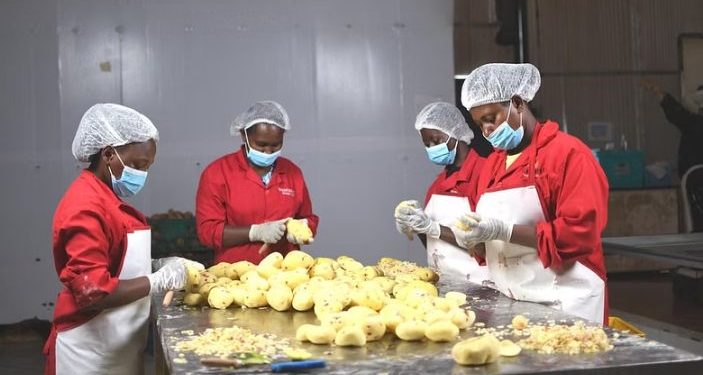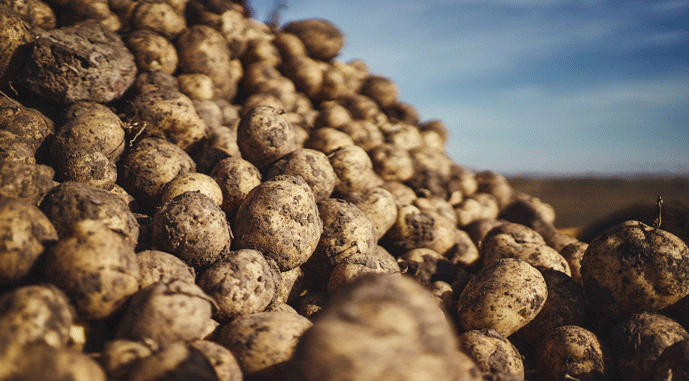#potatofarming #agro-processing #foodwaste #entrepreneurship #businesssuccess
Potato farming has been a mainstay for Kenyan farmers for decades, but it has also been a source of frustration as bumper harvests often lead to wastage due to a lack of storage facilities and limited processing options. This is where Wedgehut Foods, a potato processing company, has carved a niche. Founded by serial entrepreneur Wanjiru Mambo in 2020 during the height of the COVID-19 pandemic, the Ruiru-based company supplies processed and chilled potatoes to various establishments including hotels, hospitals, food caterers, schools, and homes.
Mambo stumbled upon the idea for Wedgehut Foods after she had to sell off her restaurant’s stock of meat, vegetables, and potatoes due to the pandemic. She noticed that the potatoes sold quickly and decided to research ways to extend their shelf life. She eventually found a gap in the value chain by focusing on potato peeling, which is a tedious and time-consuming task for companies such as fast-food restaurants. By processing and packaging the potatoes, Wedgehut Foods eases the burden of labor costs while also reducing food waste.
Mambo’s entrepreneurial spirit and business acumen have proven successful once again. She engaged a professional to help her put together projections, and in 2021, Wedgehut Foods officially began operations at Cape Business Park in Ruiru. With her experience in logistics, hospitality, and now agro-processing, Mambo has created a new opportunity in the potato value chain.
Wedgehut Foods is a prime example of how innovative thinking and a willingness to pivot during challenging times can lead to business success. By focusing on potato processing, Mambo has created a solution to a long-standing issue in the Kenyan farming industry while also providing a valuable service to various establishments. As the demand for locally-sourced, sustainable food options continues to grow, it’s likely that more entrepreneurs like Mambo will find new ways to contribute to the agro-processing industry.
From Peeling Potatoes to Owning a Food Processing Company: Lessons from Wedgehut Foods
Starting a small business can be challenging, but Wanjiru Mambo, the founder of Wedgehut Foods, shows that with persistence and hard work, one can grow a business from scratch. The company buys potatoes from farmers and processes them into various products, serving a diverse clientele ranging from supermarkets to hotels and fast food chains. With a daily processing capacity of five metric tonnes, Wedgehut Foods has grown from a 500 square feet facility to a 4,000 square feet factory with an 80kg per minute peeling machine. Mambo’s success story offers valuable insights to farmers, agronomists, agricultural engineers, farm owners, scientists, and other entrepreneurs in the agricultural sector.
It provides employment opportunities, promotes food security, and creates value addition to farm produce. Wedgehut Foods’ success story demonstrates that a food processing business can start small and grow with time. By investing in the right people, establishing standard operating procedures, and complying with food safety audits, Mambo’s company has been able to scale up its operations and increase its market share.
Potato Quality: A Crucial Factor for Success in the Food Processing Industry
One of the lessons that Mambo learned from her previous business ventures is the importance of planning ahead and conducting thorough research on the industry. She advises aspiring entrepreneurs not to start a business just because others are doing it, but to have a clear plan, including how to raise capital. Working capital management is another critical aspect that Mambo highlights. Cash flow issues can be a challenge, especially for capital-intensive businesses like Wedgehut Foods. To stay afloat, Mambo is deliberate about managing the company’s cash flow and avoiding the temptation to use working capital for capital expenditures.
One of the biggest challenges faced by potato processors is sourcing and aggregation of potatoes. With the current drought in many parts of the world, the scarcity and consistency of potato supplies can become a major concern for businesses like Wedgehut Foods. To tackle this, the company is negotiating with clients to shorten credit periods and improve cash flow.
Ensuring the quality of potato supplies is also crucial. Despite years of experience in farming potatoes, farmers may not have the technical know-how required to grow potatoes of the right size and variety. This creates an information gap between the farmers and the processors, making it essential for processors to provide clear guidelines to their suppliers.
While competition is fierce in the food processing industry, there are still ample opportunities for businesses to grow and diversify. Wanjiru Mambo plans to expand her product line into potato flour-making and other vegetables while continuing to run her Express Courier and Mambo Logistics companies. However, to achieve this, she understands the importance of seeking help from investors and delegating responsibilities to others.
Maintaining potato quality is crucial for the success of food processing businesses like Wedgehut Foods. With the right strategies in place, such as negotiating credit periods and providing clear guidelines to farmers, potato processors can overcome challenges related to sourcing, aggregation, and quality, and thrive in a highly competitive industry.







